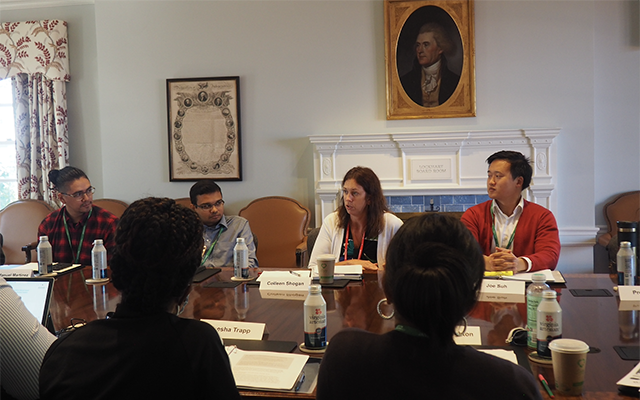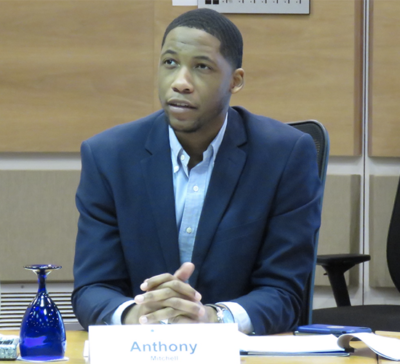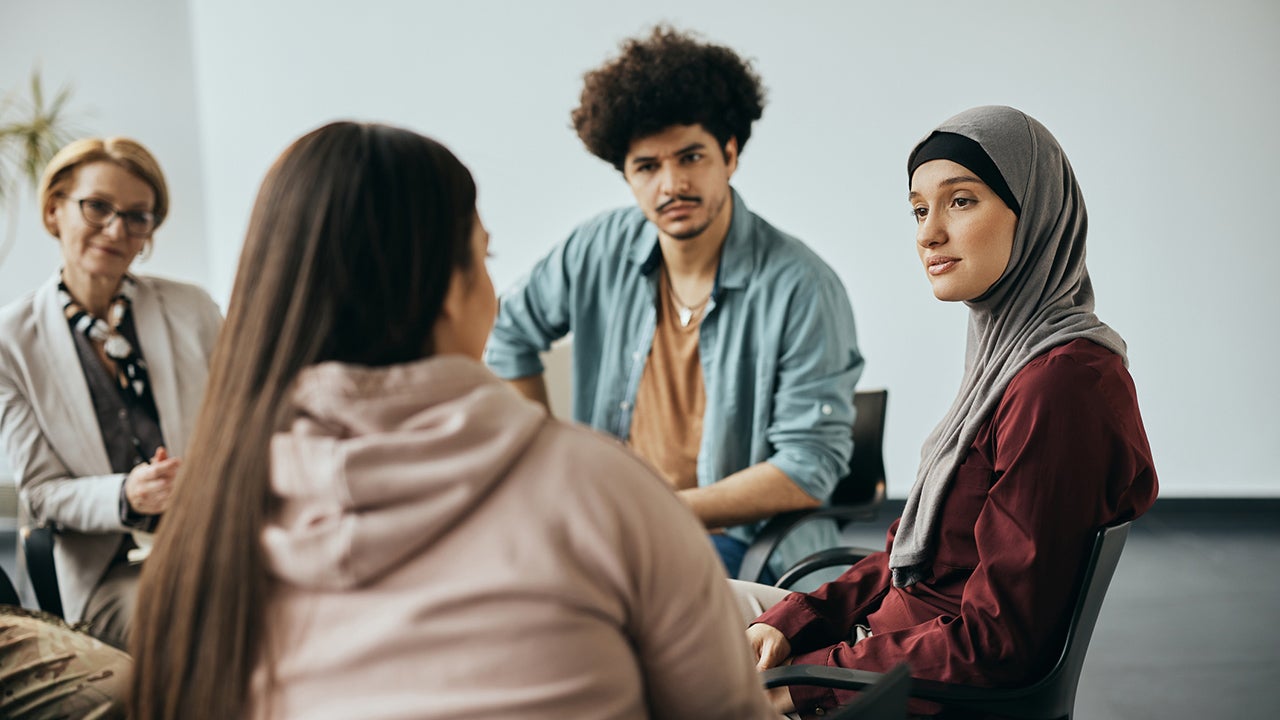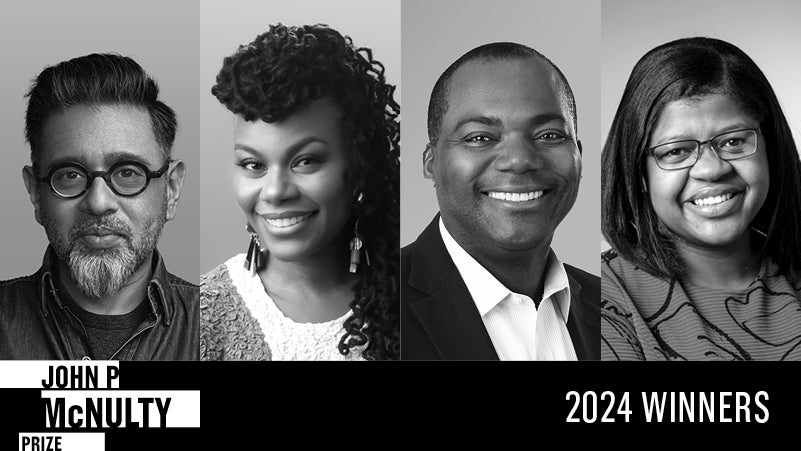On a bright afternoon this past August, a group of 15 strangers sat around a seminar table at Monticello, the Virginia home and primary plantation of Thomas Jefferson. Gathered were Congressional staffers from the House and Senate, state government employees, executive branch staffers, and military personnel. Each participant brought a unique personal and professional background, but together they shared a common purpose—learning about the history and future of the legislative branch. The energy in the room alternated between nervous and excited as they began discussions led by Colleen Shogan, who developed the seminar curriculum. Shogan has since been nominated to serve as Archivist of the United States.

Colleen Shogan leading a seminar at Monticello
Over two days, the Emerging Governance Leaders Seminar (EGL) participants explored the grounds of Monticello. They visited the burial ground for enslaved people and listened to a fireside chat with Gayle Jessup White, author of the book Reclamation: Sally Hemings, Thomas Jefferson, and a Descendant’s Search for Her Family’s Lasting Legacy. This helped them dive into the complexities of the site’s past—and America’s founding.
The EGL seminar series was developed by the Aspen Socrates Program and piloted in 2018. Every year, it brings congressional staffers and other young people in government service around the seminar table to deepen their understanding of the United States Congress. The Socrates EGL seminar experience serves the next generation of civil servants with the aim of strengthening American democracy. It is part of a larger initiative piloted by Democracy Fund and the Hewlett Foundation.
“We particularly admire the Emerging Governance Leaders Seminar’s emphasis on empowering each of its participants to participate in efforts to increase diversity and inclusion in the halls of Congress, and its ability to put partisan politics aside,” said Rudy Mehrbani, senior director of the Governance Program at Democracy Fund. “More than an insular seminar series, participants gain invaluable technical skills and build relationships to expand their professional networks throughout their careers.”
More than 150 alumni of the EGL program have joined digital and in-person seminars offered over the past five years. Below, read the reflections of two former participants.
Anthony Mitchell
May 2019 EGL Seminar participant
Former Legislative Correspondent, Office of Senator Jeff Merkley (D-OR)
Current Senior Manager, Transit and Micromobility Policy, Lyft
What were your expectations going into the seminar, and how did you feel coming out?
I thought it was going to be a typical Hill Staffer getaway where all we would talk about was politics and recite talking points eluding to partisan gridlock. But when I got there, I met some really amazing people. The seminar was an opportunity to challenge and push ourselves through critical, in-depth dialogue—and gave us tangible ways to build meaningful relationships with people who have different political perspectives, values, and approaches to issues. We talked about how we can solve the challenges confronting our country—ones we are all trying to solve.
Not only was the experience enriching professionally, but personally as well. In particular, the historic location [at the Wye River campus] lent itself as a great backdrop to a more candid conversation about where we are headed as a country. Further, the scenic aspect of the campus allowed us to explore the grounds during breaks and created an atmosphere where we could be human together.
What did you think of the Socratic-style seminar?

Anthony Mitchell
It’s different from what I’ve experienced previously. What makes it so cool is the seminar is very free-flowing and ideas-driven. It’s very provocative because of the different perspectives—there is a richness in the conversations, informed by various lived experiences and realities. By not delving into the practical, programmatic, and tangible but addressing the abstract issues and values behind the system, we could have an authentic flow of thoughts, collaboration, and dialogue. This encourages people to listen to and respect new thoughts and ideas.
Can you recall a standout moment during your seminar?
There were two equally important moments. The first was actually the initial session which set the pace and tone for how vulnerable, transparent, raw, and real we could be together. We had a great moderator who made it very clear that nothing left the seminar room.
Secondly, we were in a session in the main hall, where we roasted marshmallows around a campfire. There was so much diversity in our group, but we would later find that we had so much in common—there are more things that connect us than divide us. This would not have happened if we didn’t participate.
The real “lightbulb moment” happened while sitting at this firepit, talking about our childhoods. I remember thinking, That’s how I grew up, as members of my shared their upbringings. Overall, we had a great group of people who made each session intellectually stimulating. We were able to be authentically ourselves. Those moments outside of the seminar room allowed us to expand our thinking inside the room. We found common ground, and we found some sort of ethos. The structured conversations and the informal social time outside were an integral coupling.
What was your main takeaway from the experience?
I would recommend it to anybody. I recommend it to people who are exploring themselves and are new to their careers, as well as people who are unafraid of having candid conversations because there was a lot of growth. I got to question things due to different perspectives—enriching personal and professional experiences to see how people walk in their shoes.
It’s all about the relationships! When we embrace those with different vantage points, abstract constructs around politics and ‘governance’ are broken down—especially when you can put a name and a face to the other side of an idea. We realized that a lot of people want the same thing.
Caitlin Soto
2018 EGL Seminar participant
Counsel, Judiciary Committee, Ranking Member Charles E. Grassley (R-IA) at United States Senate
What are some of the obstacles that you encounter working in government?
Partisanship is definitely the hardest part of this job. It can be a challenging environment if you’re trying to build bridges. The seminar experience made me realize that we can do better when we seek out diverse and individual perspectives. And EGL has kicked off that thinking—it has been a guiding post for me.
Do you feel like part of a cohort with your fellow seminar alums?
It’s been challenging these past few years, but I talk a lot with one other alum. The pandemic has been difficult. Virtual work is not the same. You can’t discount person-to-person relationships.
What did you think of the Socratic-style seminar?
As a lawyer, I’m biased. I really appreciated the Socratic-style aspect. I believe it led to a more robust conversation and dialogue. We actually participated in the full session. It made it more enjoyable not only for me but for the moderators. It made you a more active listener and forced you to think more critically about the topics discussed.
Were you able to see and experience a diversity of thought?
My cohort was more-or-less evenly split between Dems and Reps. There were also Hill folks and non-Hill folks. The moderators would play us off one another—in a good way. Through this model, we had a robust discussion that included different points of view. I think it speaks to the robustness of the conversation. The dialogue gave us a unique perspective.
These interviews have been lightly edited for length and clarity.


